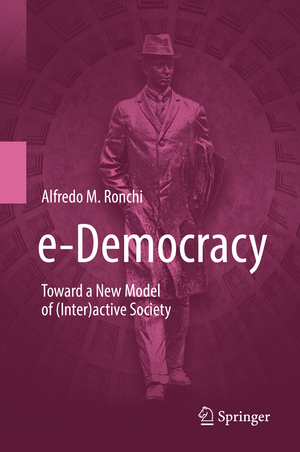e-Democracy: Toward a New Model of (Inter)active Society
Autor Alfredo M. Ronchien Limba Engleză Hardback – 26 apr 2019
This book explores the main elements of e-Democracy, the term normally used to describe the implementation of democratic government processes by electronic means. It provides insights into the main technological and human issues regarding governance, government, participation, inclusion, empowerment, procurement and, last but not least, ethical and privacy issues. Its main aim is to bridge the gap between technological solutions, their successful implementation, and the fruitful utilization of the main set of e-Services totally or partially delivered by governments or non-government organizations.
Today, various parameters actively influence e-Services’ success or failure: cultural aspects, organisational issues, bureaucracy and workflows, infrastructure and technology in general, user habits, literacy, capacity or merely interaction design. This includes having a significant population of citizens who are willing and able to adopt and use online services;as well as developing the managerial and technical capability to implement applications that meet citizens’ needs. This book helps readers understand the mutual dependencies involved; further, a selection of success stories and failures, duly commented on, enables readers to identify the right approach to innovation in governmental e-Services.
With its balanced humanistic and technological approach, the book mainly targets public authorities, decision-makers, stakeholders, solution developers, and graduate students.
Preț: 336.86 lei
Preț vechi: 421.08 lei
-20% Nou
Puncte Express: 505
Preț estimativ în valută:
64.49€ • 67.29$ • 54.06£
64.49€ • 67.29$ • 54.06£
Carte tipărită la comandă
Livrare economică 13-27 martie
Preluare comenzi: 021 569.72.76
Specificații
ISBN-13: 9783030015954
ISBN-10: 3030015955
Pagini: 230
Ilustrații: XIV, 242 p. 26 illus. in color.
Dimensiuni: 155 x 235 mm
Greutate: 0.54 kg
Ediția:1st ed. 2019
Editura: Springer International Publishing
Colecția Springer
Locul publicării:Cham, Switzerland
ISBN-10: 3030015955
Pagini: 230
Ilustrații: XIV, 242 p. 26 illus. in color.
Dimensiuni: 155 x 235 mm
Greutate: 0.54 kg
Ediția:1st ed. 2019
Editura: Springer International Publishing
Colecția Springer
Locul publicării:Cham, Switzerland
Cuprins
1 Being Human in the Digital Age: e-Democracy.- 2 Governance and e-Governance.- 3 e-Participation.- 4 e-Inclusion & e-Empowerment.- 5 e-Government: background, today’s implementation and future trends.- 6 e-Procurement.- Index.
Notă biografică
Alfredo M. Ronchi is a Professor at the Politecnico di Milano, Secretary General and Head Representative of the MEDICI Foundation at ITU headquarters in Geneva and UNESCO IFAP, Director of the JRC S2D2 (Safety & Security), and former main representative of OCCAM at the United Nations Headquarters in Geneva (1999-2016). He is a member emeritus of the WSA Board of Directors and President of eContentAwardItaly, member of the Scientific Committee of Global Forum (F-USA), Sacred World Foundation (India), Fondazione Nuove Comunicazioni (Italy) and coordinator of several international projects. He has collaborated with the Council of Europe, the World Bank, UNESCO, Austrian Ministry of Culture, Finnish Ministry of Culture, Italian Ministry for Foreign Affairs (Culture Counts, Florence ‘99), and the Municipality of Christiansand (Norway). He has published more than 400 papers and books on e-Culture, e-Government, e-Learning (and other e-Services), and has been a (co-)organizer andprogramme chair for international conferences and workshops run by W3C, the ACM and IEEE.
Textul de pe ultima copertă
This book explores the main elements of e-Democracy, the term normally used to describe the implementation of democratic government processes by electronic means. It provides insights into the main technological and human issues regarding governance, government, participation, inclusion, empowerment, procurement and, last but not least, ethical and privacy issues. Its main aim is to bridge the gap between technological solutions, their successful implementation, and the fruitful utilization of the main set of e-Services totally or partially delivered by governments or non-government organizations.
Today, various parameters actively influence e-Services’ success or failure: cultural aspects, organisational issues, bureaucracy and workflows, infrastructure and technology in general, user habits, literacy, capacity or merely interaction design. This includes having a significant population of citizens who are willing and able to adopt and use online services; as well asdeveloping the managerial and technical capability to implement applications that meet citizens’ needs. This book helps readers understand the mutual dependencies involved; further, a selection of success stories and failures, duly commented on, enables readers to identify the right approach to innovation in governmental e-Services.
With its balanced humanistic and technological approach, the book mainly targets public authorities, decision-makers, stakeholders, solution developers, and graduate students.
Caracteristici
Explores the main elements of e-Democracy, the term normally used to describe the implementation of democratic government processes through electronic means Provides insights into the main technological and human issues regarding governance, government, participation, inclusion, empowerment, public procurement and, last but not least, ethical and privacy issues Includes a selection of success stories and failures that enable readers to identify the right approach to innovation in governmental e-Services
